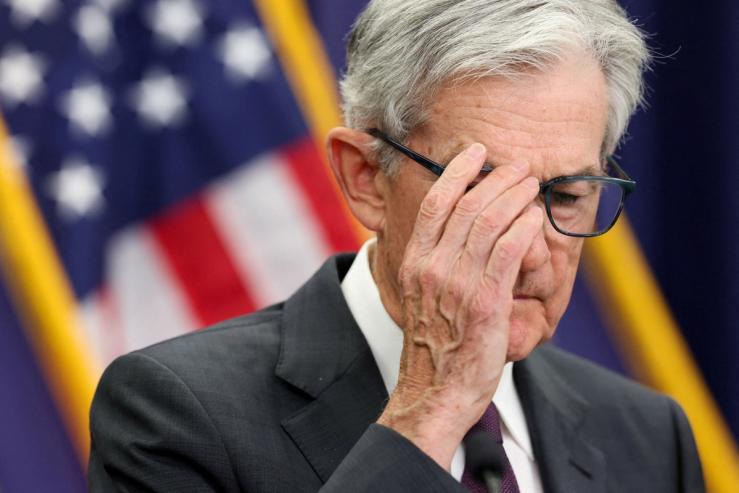The News
The Federal Reserve is expected to again leave interest rates untouched on Wednesday, despite a long-running pressure campaign from President Donald Trump.
And that’s no problem for quite a few of his Republican allies in Congress.
Take Sen. Cynthia Lummis, R-Wyo., who’s no fan of Chair Jerome Powell (or “Powoke,” as she recently dubbed him).
Asked about the Fed’s inaction on short-term rates, she argued that “we should probably be paying more attention to long-term interest rates” that are shaped by expectations around growth, inflation, and debt, in addition to Fed policy.
Those long-term interest rates are “more indicia of concern that purchasers of US bonds are having about our inability to address our structural debt and deficit,” Lummis told Semafor.
“It’s the long-term rates that [have] Wall Street concerned [and] buyers of our bonds concerned, because we as a Congress are not addressing our debt and our deficit properly,” she said.
She’s not the only Republican who’s loath to echo Trump’s main critique of the Fed, which he openly aired during a rare visit to its headquarters last week where he urged Powell bluntly “to lower interest rates.” Several GOP lawmakers told Semafor that their issues with interest rates center on the Fed’s regulations and the US’ borrowing — not the Fed’s monetary policy decisions.
Rep. Warren Davidson, R-Ohio, said he’s argued to Trump that his interest-rate goals might be better accomplished by directing the Fed to pay banks less interest on their excess reserves. That move, Davidson argues, would nudge banks to lend out more of that money in a more reliable way to rein in borrowing costs than the Fed cutting rates.
“The thing that I’ve cautioned, including in talk with the president, is: Last time Jerome Powell lowered interest rates … the market responded by actually increasing market rates,” Davidson said. “It’s not like we have a system where it’s a command economy, where one person can set all the rates.”
Other congressional Republicans aligned themselves with the Fed in emphasizing the need for more insight into the effects of Trump’s trade agenda before rates can come down.
“We should have lower interest rates as long as it will not cause inflation, and as long as tariffs will not cause inflation, and we don’t know the answer to any of those questions yet. That’s why the Fed is being cautious,” Sen. John Kennedy, R-La., said.
“Once you let this cat out of the bag,” he added, “it’s pretty hard to get it back in.”
“The White House respects the independence of the Fed in carrying out its monetary policy objectives,” White House spokesperson Kush Desai said. Trump’s take is that “data clearly shows that President Trump’s supply-side policies have swiftly tamed Joe Biden’s inflation crisis, which would be consistent with interest rate cuts.”
Desai pointed to one top economist’s recent comments that the Fed “should be cutting this month.”
In this article:
Know More
At the heart of the difference of opinion between Trump and some of his Hill allies is a tension in the president’s case for lower rates: that the economy is stronger than ever thanks to his policies, and that the Fed should be making it easier to borrow as a result.
The central bank typically cuts rates to boost a cooling economy and raises them to rein in an overheating one.
Asked how to reconcile Trump’s dueling assertions, Rep. Frank Lucas, R-Okla., suggested that question be asked of “the people who actually advocate that.”
Lucas chairs the House Financial Services Committee’s task force on monetary policy.
Other congressional Republicans were willing to critique the Fed’s rate-setting, but they pivoted quickly to the growing debt as a bigger source of economic worries.
“Obviously the Fed could make adjustments; no doubt about that,” Rep. Byron Donalds, R-Fla., said. “But the other piece is spending.”
“So my recommendation — it’s not a recommendation to the president, but … my colleagues on the Hill — let’s cut spending,” Donalds added.
Room for Disagreement
The GOP is by no means united in diverging from Trump’s logic as he pushes Powell to cut rates. During a hearing last month, New York Rep. Mike Lawler fell in line with the president to chide the bank chief for being “late” to lower borrowing costs.
And Senate Banking Chair Tim Scott, R-S.C., gave a hearty endorsement to the president’s calls for the Fed to cut when he accompanied Trump to the central bank last week.
“Americans deserve to become first-time homebuyers; President Trump has created the best economy in the world,” Scott said. “The one thing that would make it better is lower interest rates.”


